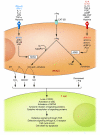Altered macrophage differentiation and immune dysfunction in tumor development
- PMID: 17476345
- PMCID: PMC1857267
- DOI: 10.1172/JCI31422
Altered macrophage differentiation and immune dysfunction in tumor development
Abstract
Tumors require a constant influx of myelomonocytic cells to support the angiogenesis and stroma remodeling needed for their growth. This is mediated by tumor-derived factors, which cause sustained myelopoiesis and the accumulation and functional differentiation of myelomonocytic cells, most of which are macrophages, at the tumor site. An important side effect of the accumulation and functional differentiation of these cells is that they can induce lymphocyte dysfunction. A complete understanding of the complex interplay between neoplastic and myelomonocytic cells might offer novel targets for therapeutic intervention aimed at depriving tumor cells of important growth support and enhancing the antitumor immune response.
Figures



References
-
- Mocellin S., et al. Part I: Vaccines for solid tumours. Lancet Oncol. 2004;5:681–689. - PubMed
-
- Serafini P., Borrello I., Bronte V. Myeloid suppressor cells in cancer: recruitment, phenotype, properties, and mechanisms of immune suppression. Semin. Cancer Biol. 2006;16:53–65. - PubMed
-
- Maier T., Holda J.H., Claman H.N. Natural suppressor cells. Prog. Clin. Biol. Res. 1989;288:235–244. - PubMed
Publication types
MeSH terms
LinkOut - more resources
Full Text Sources
Other Literature Sources
Medical

